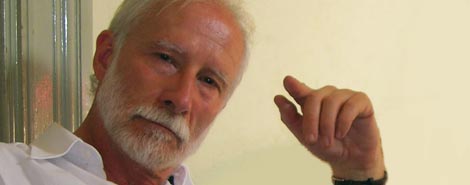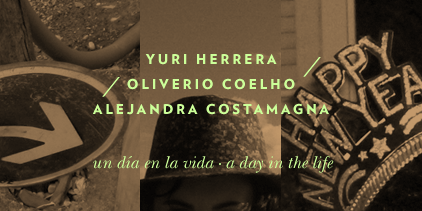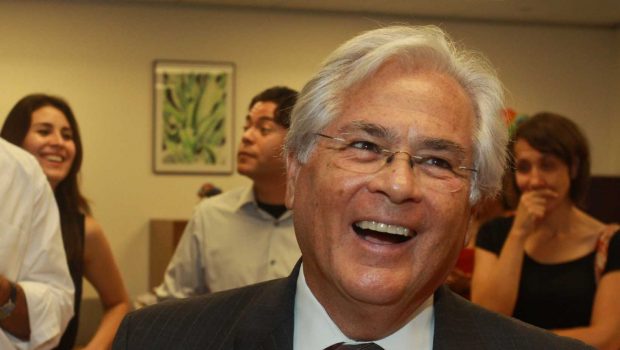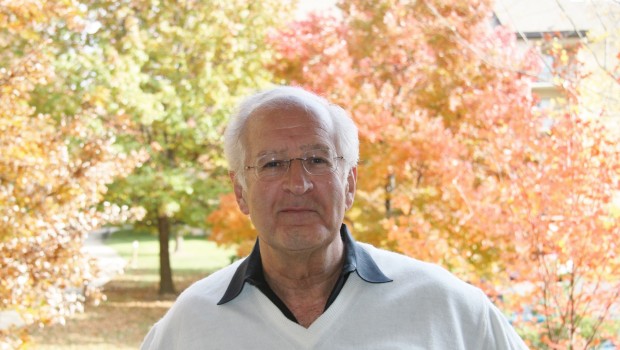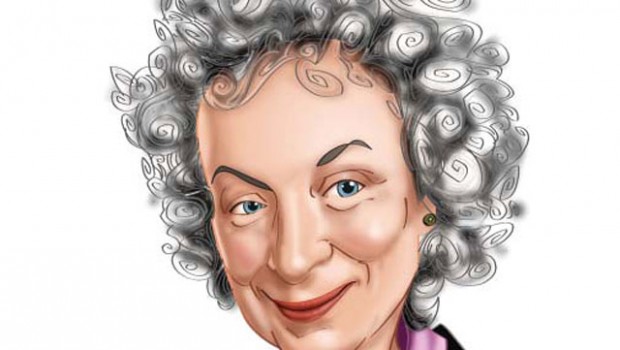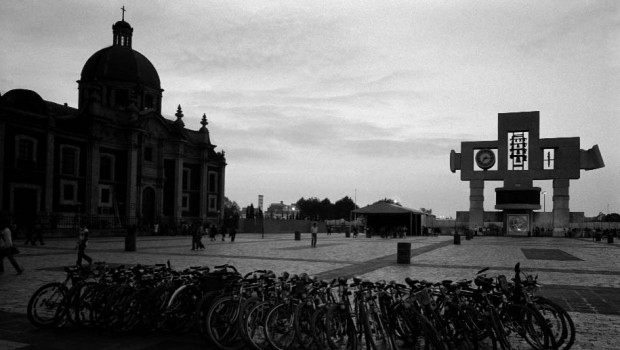The Necessity of Speaking: A Conversation with Eduardo Milán
Steven J. Stewart
Translated to English by Steven J. Stewart and Patrck Madden
Eduardo Milán was born in Rivera, Uruguay in 1952. His mother died when he was a year old, and when he was a teenager his father was sent to prison for being affiliated with the Tupamaro guerrilla movement. Milán has published numerous books of poetry, several collections of criticism, and two notable anthologies of Spanish-language poetry. He currently resides in Mexico.
* * *
Steven J. Stewart: You were born and raised in Uruguay but have lived in Mexico for many years. Do you consider yourself a Uruguayan poet or a Mexican poet? Or is there for you and your work a significant distinction between the two?
Eduardo Milán: I consider myself a Uruguayan poet in sensibility, poetic conception, and formation. In any case, Mexico has offered me a lot in terms of knowledge and experiences. My children were born here, my wife is Mexican. But there is something else that is significant: when you leave a country for certain reasons (political ones in my case: in Uruguay there was a military dictatorship in 1979, my father was imprisoned), painful reasons, you enter into a foreign territory that is a territory that has to do with the poetic. We’re all fond of repeating that poetry is a non-place. But we all know that it is, or can be, the place of the foreigner. Or that it can be so. So I feel like a Uruguayan poet who lives in a foreign country in a particular place: Mexico. It’s not difficult, as a poet, to feel solidarity with all those who have been expelled from their homeland. And it’s also not difficult to feel the need to put down roots. Poetry is a problem of place. In my case, it touches on a problem of place that happened to me when I was a year and a half old: orphanhood, the loss of my mother. It’s a fundamental question in my life, like the imprisonment of my father. I was always a little outside, a little “out of place.” Being foreign is a kind of physical, specific authentication of previous losses. And in that respect Mexico has treated me well. All of which doesn’t mean that I don’t feel a tremendous nostalgia for Uruguay. And a great admiration for the Uruguayan people, for their capacity for resistance. What I’m telling you means, among other things, to be Latin American, a Latin American poet: to focus on poetry as an act of searching for a difficult stability in the midst of a quandary called Latin America. For me, no poetry exists outside of this consciousness: the consciousness of a precise physical place where you live, a place in the end that can at the same time be a poetic non-place. Though this sounds like a game it’s not: it’s a complex coexistence.
S. S.: What is your role as a Latin American poet?
E. M.: I don’t believe I have any special consciousness as a Latin American poet. In any case, what I ask of Latin American poets is that they have a clear sense of their tradition, the precariousness of its beginnings, the never-resolved turbulence of its history, the richness that is going against the current can mean—though at this time it’s not possible, I believe, to speak in these terms: counter-currents and currents coexist in social environments determined by interconnected circumstances. I don’t believe that Latin America is destined to fulfill an important mission at a global level—as we managed to believe towards the end of 1950 with the Cuban Revolution. I don’t believe that contemporary Latin American poetry is destined to teach the general poetic world something that it doesn’t know. We don’t have any secrets—the narrative boom wasn’t an act of magic: it was a lie, except for two presences, Cortázar and Donoso—and two absences: Rulfo and Onetti. Therefore, it’s a matter of taking on what touches us in reality and in history without forgetting our brief and heroic tradition: the one that goes from Darío to the youngest of us. But this is the case: it’s necessary to be aware; it’s not possible to have poetic writing that doesn’t recognize the ground which sustains it. The end of the world—which I don’t believe in—isn’t an alibi.
S. S.: What influence can poetry have nowadays on the world beyond that of poetry?
E. M.: I don’t know whether poetry can have any specific influence. Whatever influence poetry might have would be welcome. Poetry helps us to live, it can save someone’s life. Poetry is a marginal language with respect to other languages. And that has nothing to do with poets who get together and read out loud for whole audiences. The type of language is marginal, it sounds like it’s from another time or a child’s game, like a waste of time, like feigned seriousness, all together. In general it refuses to produce “true effects” or it plays with them. There’s a zone of the poetic that seems to take place somewhere else. But opening up perception, generating consciousness—aesthetic, political, ecological, historic, whatever type—is not a vain task. Poetry awakens and educates, as always. I don’t know if it can promise something that afterwards might be difficult to make good on. I think about a phrase by Schiller, of a dangerous utopian grandiosity: “What today we see as beauty, tomorrow we will see as truth.” You would have to replace, without letting the phrase lose its projective capacity, “beauty” with another poetic value. Because beauty is no longer an essential poetic value. It’s not possible to have two passions simultaneously that are as strong as passion for reality and passion for beauty. If the 20th century was the century of “passion for reality,” as Zizek says recalling Badiou, it’s very difficult to get out of this predicament and vindicate the utopian quality of beauty. The “real,” viewed in this way, is a devastating magnet.
S. S.: In your view, which contemporary writers (from Latin America or other parts of the world) have been able to have greater influence, and why?
E. M.: To stick with Latin America and poetry, there are few poets who have influenced beyond the continent or the language. Models of this would be Vallejo and Neruda. They are most exemplary in their most radical moment, Vallejo in Trilce and Neruda in Residencias. But I don’t know if they’ve been influential because of their radicalism. I think not. Their capacity for impact is in their work that is more “communicative” in terms of reception, Poemas humanos for Vallejo and Canto general for Neruda. There is someone who breaks from the mold: Nicanor Parra. His radicalism consists in his radical communicativeness—a communicativeness that doesn’t reject but rather accentuates the absurdity of communication—. The influence of Parra on certain North American poetry is known. I don’t know if Rulfo has had a notable influence outside of his own language. I suppose he has. A writer who, having read Rulfo, hasn’t been touched by his writing hasn’t understood anything. This is more or less what Hemingway said of someone who, having read Pound, hasn’t been influenced by Pound. But it’s different. Writers can depend a lot on their reading and the diffusion of their cultural and political contexts from which they come. Pound had the history that he had. But he’s a North American poet. And this is independent of whether or not he’s a great poet. The governments of the dominant countries at any given time—if the cultures were acting “with autonomy” nothing would happen—claim the historic part of their writers. And that’s okay. What’s not okay are the hegemonic bundles that one has to swallow when in a situation of dependence. To say nothing of the language. Writers of languages that presently have a certain hegemony will be writers who are more present than others at the cultural level. In this historic moment I believe that the influence of some writers in environments “foreign” to their culture is naturally due to dissemination—a novelist is disseminated more than a poet—or to a solidly constructed system of relations—for example, a personal publicity campaign—or to the relationships the writer has to Power. To think about the equality of conditions in the present is to be on the fringes.
S. S.: Why do you mention the members of your family (your father, your wife and children) in your poems so often?
E. M.: My family is all that I have—“having” is a way of alluding to a reality of proximity and of dependence on this proximity—apart from a few friends. So that it’s the attempt, once again, one more time, to recreate what was lost in the beginning. A need to speak so that they can continue to be (though I know that their existence doesn’t depend on my words), a way of wanting to reunite through words in the midst of an order of things, of a political, social, and economic system that is conceived, thought about, and set in motion to separate. Speaking of my loved ones is also, for me, a way of facing this precise order of things that I’ve just alluded to.
S. S.: Your poems also often have a political flavor. How does politics influence your art as a poet?
E. M.: The issue of politics is of primary importance in my life. I suppose I inherited it directly from my father, a political prisoner in an Uruguayan jail during the period that the military dictatorship lasted (1973-1985). I left Uruguay because of the military dictatorship and because my father was in jail. So that’s present. The political, though not necessarily in any evident way, is always manifested in a writer’s stance. Now, given the level of evidence of the social breakdown in which we live, at times the issue of politics appears in a more palpable way. There doesn’t necessarily have to be a symbiotic or cause-and-effect relationship between political consciousness and poetry. What I cannot tolerate is that writing whose language cannot succeed in disguising the fact that it fears being contaminated by political issues. Its effect is somewhere between shame and revulsion. It’s not an act of provoking reality with the sublime: it’s an act of cowardice.
S. S.: You write a lot about the act of writing poems, in such a way that much of your work is meta-poetic. For you, what is poetry? What is a poem?
E. M.: The question of meta-poetry is always present in what I do. It’s a defining trait—in its radical insistence—of modernity. Something is in crisis when it has to be recognized so often. What happens in poetry is that that “something is in crisis” doesn’t necessarily mean that “something is rotten in Denmark”. Poetry is, in some deep way, language that makes itself evident, repetition. Metapoetry is always latent in poetry, in the same way as anti-poetry. It’s a language that enjoys great freedom, that doesn’t have to pay tribute to either reason or coherence. It’s matter of a happiness. This doesn’t mean that one isn’t more than he believes when facing the threat of rhetoric itself, of stiffness, of saturation or banality. In my particular case existence was always a bit strange. Something had to be familiar. It happened to be the language of poetry. As far as a poem: a poem is what most closely approximates what a time period determines a poem to be. A fragmentary image of a time period given by means of language. But it’s a fragment. Coherence forms historically. For us what exists is the consciousness of the fragment. And the imagination that that fragment has a place in the historical formation of the language. For that reason it’s so important for poets to be located in their time. It’s not out of a moral deficit: it’s out of the possibility of a place in the whole. Fundamental: don’t try to compete with Quevedo. Lihn says it clearly: “I can reiterate poetry.” Exactly: reiterating is not repeating.
S. S.: With the translations that Pat Madden and I have been doing, and with Everything is Connected, the book of your translated poems and essays edited by Antonio Ochoa that is going to be published shortly in Scotland, your work is being introduced to the English-speaking world. What would you hope for English-speaking readers to take from your work?
E. M.: Well, there is that measure of stupor, of waiting, of not really knowing. You could say to yourself, “That person I admire might read me. Or that other person.” You never know. The book is a joy to me. The translations you did with Pat improve upon some of the poems in linguistic terms. There arise alliterations unforeseen in Spanish as is the case with the poem “Cuando caí encontré a mi padre” [“When I Fell I Found my Father”]. And keep in mind that the alliterative game is not my weakest point. On the other hand, my admiration for English-language poetry is something I’m always aware of. And it’s evident in certain poems. But it will always be a matter of entering into other ears, into another’s experiences of language.
S. S.: What are you writing now? How does it compare to the work you’ve already done?
E. M.: After Querencia, gracias [Longing, Thanks] (Galaxia Gutenberg, 2003), which was a type of integrated poem, written in series in the manner of Hugo Gola—one poem continued into the next, by way of motives, words or intuitions that were previously indicated—my book Acción que en un momento creí gracia [Action that I Once Thought was Grace] (2005) was published by Igitur, also in Spain. Before that, Ostras de coraje [Oysters of Courage] had been published by Filodecaballos of Guadalajara, Mexico; it’s a book that referred to the state of things generated by the events of September 11 and the invasion of Afghanistan and the worldwide threat that the United States and international terrorism, neither to the same degree nor for the same cause, constituted. A reference, the historic moment, dealt with it from the intimacy of language, to phrase it that way. One cannot compete with other languages like those of the media that, though highly redundant, are enormously efficient with respect to their diffusion. This yearLos poemas [Poems], Tablas [Tables], and Por momentos la palabra entera [For Moments the Whole Word] will also be released, three books that develop writing that tries to unite an intimate word, spoken in a soft voice, with historical contingence. I don’t know if they put an end to a cycle, nor to what degree they differ from my previous writing. What I do know is that for a long time I’ve been trying to write a poem that can capture with a greater amplitude of possible consciousness “what’s happening” without fleeing, clearly, from historical occurrences nor, and this is more difficult, from the timeliness of language as an entity that “is known.”
Posted: April 3, 2012 at 1:50 am


